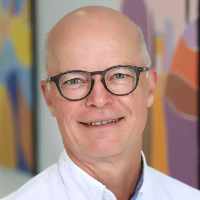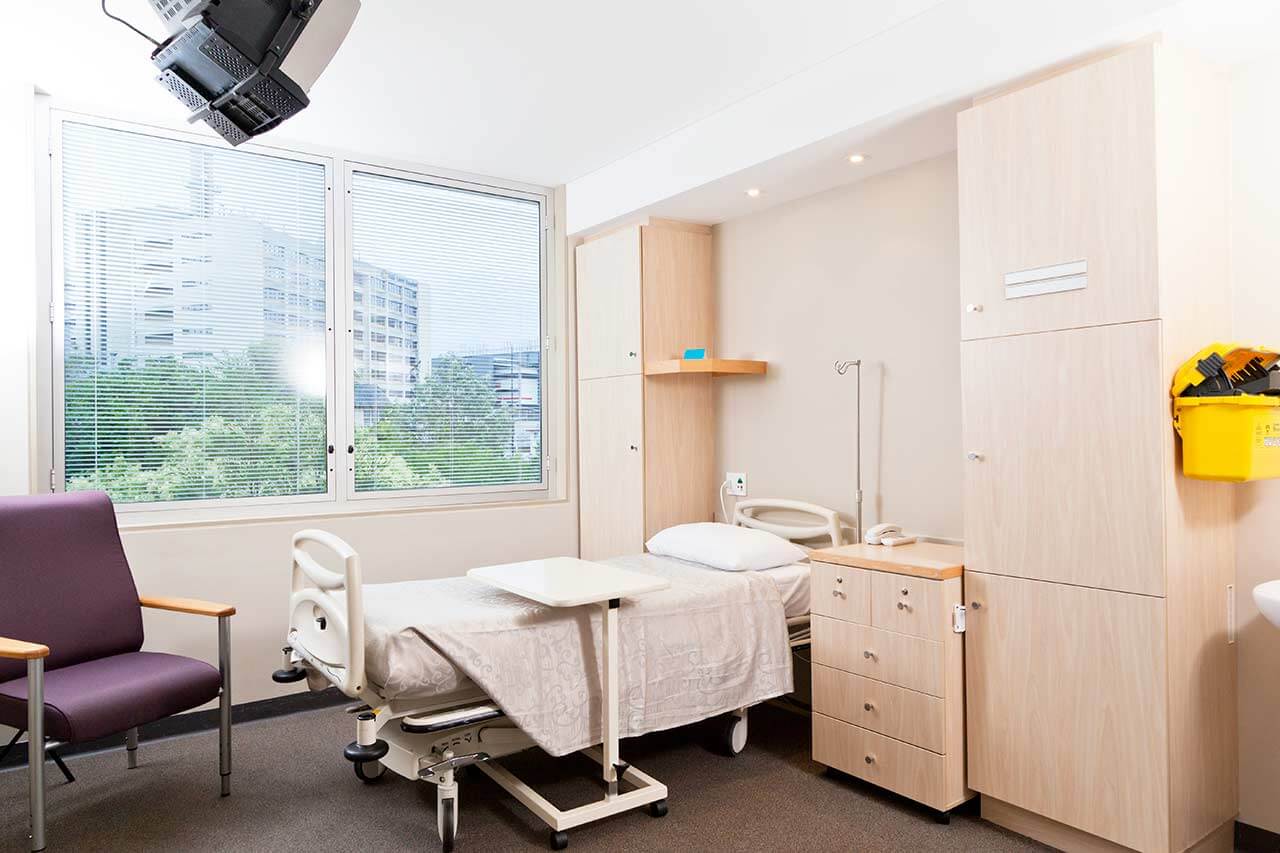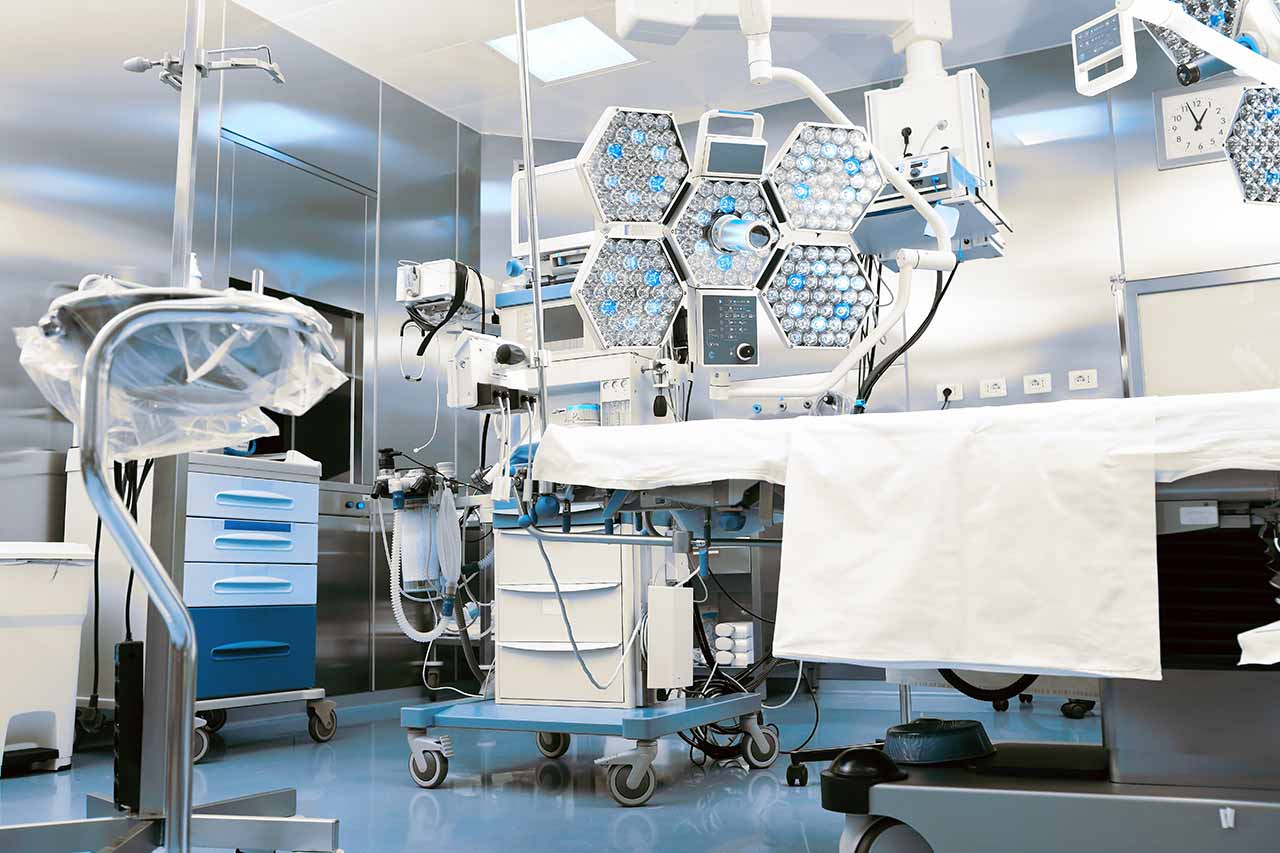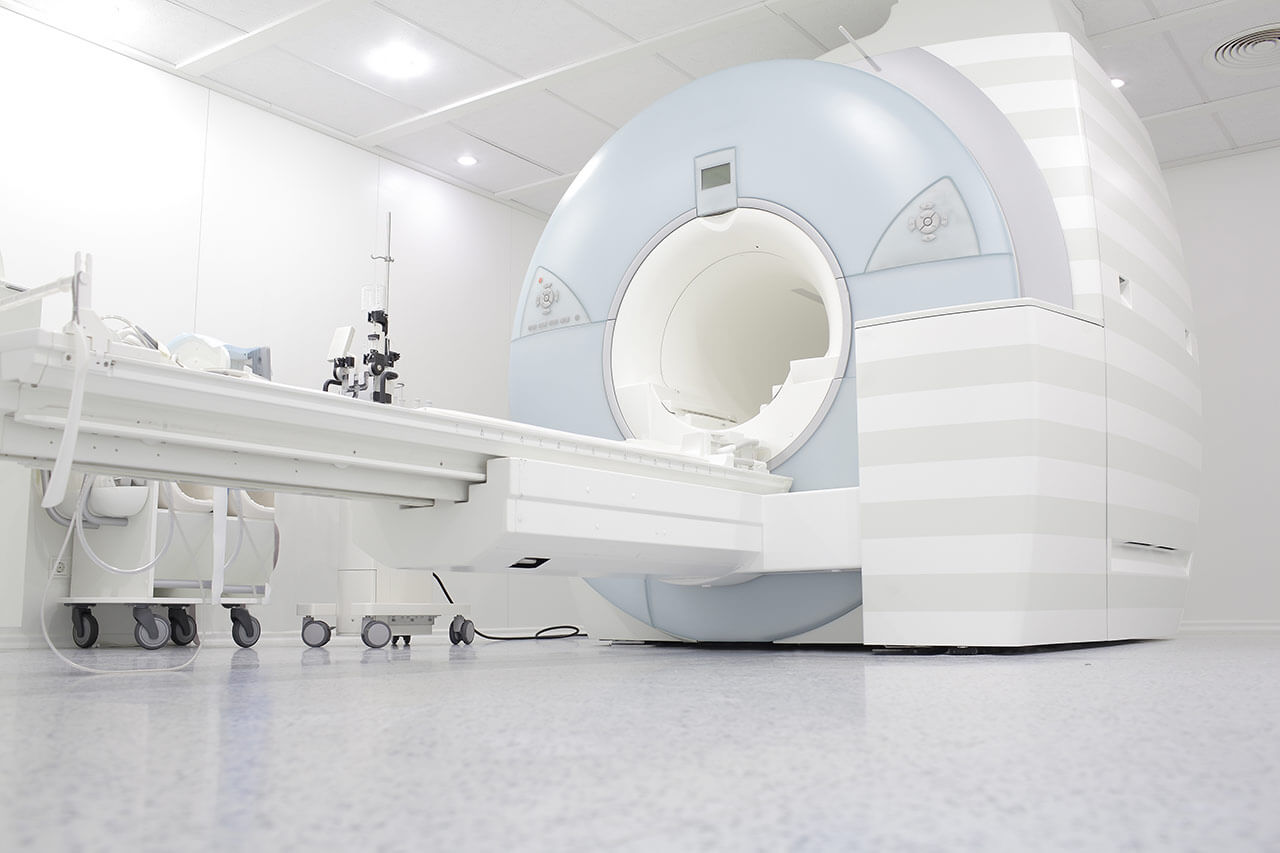
The program includes:
- Initial presentation in the clinic
- clinical history taking
- review of medical records
- physical examination
- general gynecological examination
- laboratory tests:
- complete blood count
- inflammation indicators (CRP, ESR)
- abdominal and pelvic ultrasound
- nursing services
- consultation of related specialists
- consultation of the chief physician and all leading experts
- development of individual treatment plan
- written statement
Required documents
- Medical records
- Transvaginal ultrasound (if available)
- CT scan of the abdomen and pelvis (if available)
Service
You may also book:
 BookingHealth Price from:
BookingHealth Price from:
About the department
The Department of Adult and Pediatric General, Abdominal, Hepatobiliary, Colorectal, Endocrine Surgery, Hernia Surgery and Traumatology at the St. Lukas Clinic Solingen offers the full range of surgical interventions in the areas of its specialization. The department is focused on effective and most sparing surgical treatment. The team of surgeons admits patients of various age groups with benign and malignant diseases of the gastrointestinal tract, liver, gallbladder and biliary tract, colon and rectum, as well as hernias, thyroid and parathyroid pathologies, tendon and joint injuries, bone fractures. With appropriate clinical indications, the surgical treatment can be performed on an outpatient basis. The department's operating rooms have advanced equipment and are adapted for surgical interventions of varying complexity. The department's pride is also the professionalism of surgeons who keep pace with innovations and perform most surgical interventions using minimally invasive techniques, due to which the surgical risks for the patients are almost zero. The department is headed by Dr. med. Markus Meibert.
The primary focus of the department's specialists is the surgical treatment of diseases of the digestive system: stomach, bowel, esophagus, pancreas and others. Surgeons pay special attention to the treatment of malignant gastrointestinal pathologies. Gastroenterologists, oncologists, radiation therapists and other doctors of related medical specialties are usually involved in the therapeutic process. Recently, doctors are increasingly able to avoid traumatic open surgery, so patients can count on sparing and safe minimally invasive treatment that does not require a long hospital recovery. It should be noted that the department has successful experience in the treatment of peritoneal cancer, which often develops due to advanced oncological processes in the gastrointestinal tract. Surgeons offer patients a highly effective method of fighting peritoneal cancer – hyperthermic intraperitoneal chemotherapy (HIPEC). The technique involves a surgical resection of a malignant tumor, followed by flushing the abdominal cavity with a heated solution of chemotherapy agents. Unlike classical chemotherapy, the drugs directly affect the cancer cells in the abdominal cavity, which achieves an excellent treatment outcome and eliminates side effects. The HIPEC procedure requires special professional skills, so it is available only in the leading medical centers in Europe.
Of particular interest among the benign digestive pathologies is the treatment of gastroesophageal reflux disease, in which the gastric acidic contents enter the esophagus. Heartburn and belching are the most common symptoms of this pathology. The main cause of the development of the disease is diaphragmatic hernia. In most cases, the department performs minimally invasive surgery using special instruments and a miniature camera. This type of surgery has a number of advantages, in particular, the absence of a severe pain syndrome, minor postoperative scars and a reduced period of hospital stay.
In the field of surgical hernia repair, doctors perform interventions for inguinal hernias and anterior abdominal wall hernias. The department's surgeons perform minimally invasive hernioplasty, so patients do not have to worry about postoperative recovery. The medical facility has been awarded the quality certificate of the German Hernia Society (DHG), which indicates compliance with therapy standards and high treatment success rates.
Hepatobiliary surgeons deal with the treatment of patients with liver, gallbladder and biliary tract diseases. The most common pathologies include benign and malignant neoplasms in these organs, gallstone disease, hepatic colic, gallbladder and biliary tract inflammation. In most cases, surgeons use low traumatic techniques for tumor removal. Liver tumors are also successfully treated with thermal ablation. In gallstone disease complicated by hepatic colic or cholecystitis, surgeons also perform gallbladder removal surgery. Cholecystectomy is performed using minimally invasive techniques, under general anesthesia. As a rule, a hospitalization period lasts no more than 7 days. The gallbladder removal surgery does not adversely affect the patient's quality of life.
In the field of colorectal surgery, diverticulitis, ulcerative colitis, Crohn's disease, colon and rectal cancers are treated. Depending on the stage of the pathology and the nature of its course, minimally invasive and classical open surgical interventions are performed. The operation is usually supplemented with drug therapy, and in the case of cancer, with other types of treatment.
The department also specializes in the treatment of endocrine diseases. The competence of endocrine surgeons includes interventions for goiter, benign and malignant tumors of the thyroid and parathyroid glands. Depending on the particular clinical case, a partial or total resection of the thyroid gland, parathyroid glands is performed. When performing thyroid surgery, doctors use neuromonitoring: this allows the specialists to maintain the integrity of the recurrent laryngeal nerve and prevent voice disorders. Thanks to the use of low traumatic techniques, the patient is guaranteed an excellent aesthetic result.
The department's team of doctors provides the treatment of injuries of varying severity, including tendon and joint injuries, as well as bone fractures. The specialists use conservative and surgical techniques. In case of joint injuries, the surgeons of the medical facility use such therapeutic options as knee arthroscopy, total hip replacement and reconstructive tendon surgery. Bone fractures are most often treated with the use of titanium rods, external fixators, plates and other devices. The medical facility provides top-class services recognized by the quality certificate of the German Society of Trauma Surgery.
Along with the treatment of adults, an important area of work of the department is surgical interventions in children. When dealing with the treatment of children, the department's specialists use special approaches. Pediatric surgeons have extensive knowledge of organ systems, as well as understand the growth and maturation of children. In addition, young patients require a special approach, understanding of their needs and fears. Surgical interventions on children can also be performed on an outpatient basis, for example, in the treatment of the genitourinary diseases and injuries.
The department's main clinical activities include:
- General and abdominal surgery
- Surgical treatment of benign and malignant diseases of the gastrointestinal tract: stomach, bowel, esophagus, pancreas
- Hepatobiliary surgery
- Surgical treatment of diseases of the liver, gallbladder and biliary tract
- Colorectal surgery
- Surgical treatment of diverticulitis, ulcerative colitis, Crohn's disease, colon and rectal cancer
- Endocrine surgery
- Surgical treatment of benign and malignant diseases of the thyroid gland and parathyroid glands
- Surgical treatment of hernias
- Surgical treatment of inguinal hernias and anterior abdominal wall hernias
- Traumatology
- Conservative and surgical treatment of tendon and joint injuries, bone fractures
- Pediatric surgery
- General surgical interventions
- Surgical treatment of genitourinary diseases in boys
- Treatment of injuries in children
- Other surgical options
Curriculum vitae
Dr. med. Markus Meibert has been the Head of the Department of Adult and Pediatric General, Abdominal, Hepatobiliary, Colorectal, Endocrine Surgery, Hernia Surgery and Traumatology at the St. Lukas Clinic Solingen for over 20 years. Since August 2000, he has also worked as Medical Director of the St. Lukas Clinic Solingen. The specialist has vast clinical experience. He has saved the lives of thousands of patients with pathologies of varying severity. The doctor is a member of the Professional Association of German Surgeons.
Dr. Markus Meibert received his medical education at the Faculty of Medicine of the University of Cologne. This was followed by board certification in surgery, abdominal surgery and traumatology. The doctor also has additional qualifications in special abdominal surgery, colorectal surgery and minimally invasive surgery.
Photo of the doctor: (c) St. Lukas Klinik GmbH
About hospital
The St. Lukas Clinic Solingen provides high-quality medical services at an international level, while the humane values of Catholicism are the fundamental principle of the work of the medical staff. The clinic has been successfully practicing for over 60 years, and during this time it has managed to save thousands of human lives. As of today, the clinic has the status of one of the leading medical facilities in Germany and regularly admits patients from other countries. The key focuses of the clinic are internal medicine, gastroenterology, cardiology, oncology and hematology, neurology, general and abdominal surgery, oral and maxillofacial surgery. The clinic is located on the territory of a natural reserve, which favorably affects the recovery of patients after treatment.
The medical center is part of the Kplus Group of Catholic hospitals. Within this group, it cooperates closely with other medical facilities located in Hilden, Hahn, Monheim am Rhein and Leverkusen. Such cooperation and exchange of experience allow doctors to provide their patients with top-class medical care. The clinic also pays attention to the training of future doctors and offers a wide range of opportunities for advanced training and retraining of personnel within the Kplus Group.
The medical team of the clinic consists of more than 550 employees. Doctors and nursing staff undergo a strict selection process, constantly improve their professional skills, exchange experience with colleagues from other reputable medical facilities in Germany – all this contributes to the provision of effective medical care to patients. The doctors of the clinic admit about 12,000 inpatients annually. In addition, every year, more than 17,000 outpatients receive medical care here.
The exceptionally high quality of treatment is confirmed by prestigious certificates. For example, the Department of Surgery is awarded with the DHG-Siegel quality certificate of the German Hernia Society, the Cancer Center Solingen is certified according to DIN EN ISO 9001 standard, the Stroke Unit of the clinic has the LGA Intercert certification, the Trauma Center is certified according to the standards of the German Society for Trauma Surgery (DGU).
Photo: (с) depositphotos
Accommodation in hospital
Patients rooms
The patients of the St. Lukas Clinic Solingen live in comfortable rooms with a modern design. Each patient room is equipped with an ensuite bathroom with shower and toilet. The standard patient room includes an automatically adjustable bed, a bedside table, a wardrobe for storing clothes and personal belongings, a table and chairs for receiving visitors, a TV, a radio and a telephone. The rooms also have access to Wi-Fi.
Meals and Menus
The clinic has developed a high-quality nutrition program. Breakfast and dinner are served buffet style. For lunch, there is a daily changing full menu, as well as a choice of dietary and vegetarian menus. Also, if desired, one can order soup and dessert, afternoon coffee with pastries. In addition, Lukas Cafe on the ground floor of the clinic offers a large variety of food and drinks. A terrace for up to 20 guests is available in summer. The cafe is open from 7:00 to 18:00 everyday.
Further details
Standard rooms include:
Religion
Both catholic and gospel masses are held in the chapel on the ground floor.
Accompanying person
Your accompanying person may stay with you in your patient room or at the hotel of your choice during the inpatient program.
Hotel
You may stay at the hotel of your choice during the outpatient program. Our managers will support you for selecting the best option.




